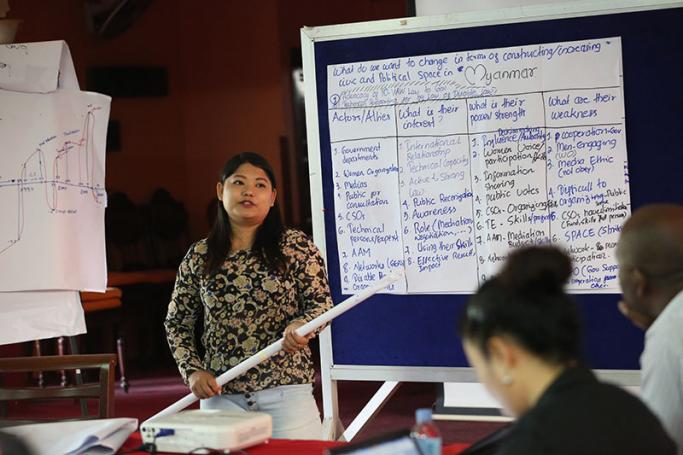ActionAid recently held training for civil society personnel from Myanmar, Cambodia and Thailand at a five-day workshop in Phnom Penh. The title of the workshop was Shrinking Civic and Political Space.
The workshop ran from December 5 to 9. The training was held for civil society workers and NGO workers and included trainers from Kenya, Uganda and Zimbabwe.
Following a survey carried out by ActionAid International in 2015, it was found that Cambodia, Myanmar and Thailand are among the countries where states are thwarting space for citizens to engage with people in power, make choices, organise, and demand accountability from government and corporations, according to Henry Muguzi, a development consultant from Uganda, who was one of the trainers during the workshop.
All three Southeast Asian countries to varying degrees face problems of governments and institutions that restrict the freedom of people and civil society organisations to operate. Thailand is currently under a military dictatorship, with serious limits on freedom of speech. Cambodia is effectively a one-party state, with limits on free speech and demonstrations. Myanmar, despite the arrival of Aung San Suu Kyi’s National League for Democracy, still labours under outdated laws which limit freedom of speech and action, and has a constitution that gives the military inordinate power.
As Mr Muguzi told Mizzima, the workshop was intended to enable ActionAid country offices and partner organisations to undertake a contextual analysis of shrinking civic and political space, and use the knowledge obtained to design country-specific engagement strategies to facilitate the defence and expansion of civic and political space, and undertake appropriate actions.
As Mr Muguzi said, a similar survey by Civicus classified these countries as repressive.
“Repressive means that people live in states where their basic rights to freedom of association, peaceful assembly, and expression are being curtailed or denied. In these countries, vague provisions in laws are applied arbitrarily under the guise of public management, anti-money laundering, anti-terrorism, national security, public morals, and protection of national sovereignty among others things,” he said.
As NkathaNercy, an associate trainer from MS-Training Centre for Development Cooperation in Kenya, said, shrinking civic and political Space has been identified as a key concern by ActionAid Country Directors and as one of the main elements impeding their ability to execute their mandate in their respective countries over time.
“Essentially, it is becoming increasingly difficult for development actors to embark on interventions towards structural poverty reduction when the space to do so is being restricted by political regimes. This, through legislation or (arbitrary) crackdowns on Non-State Actors operations. Broadly then, I believe, this might have been the concern that was put into consideration when inviting these nations,” she said.
The discussions we had over the course of the five days proved this. We were able to show how our governments are being very clever and innovative in curtailing civil society space including the operating environment for media and human rights defenders. Our discussions were proof that in fact, shrinking civic and political space is both a real and felt concern,” Ms Nercy said.
“Citing my own country Kenya, I would say that Shrinking Civic and Political Space as a problem exists and is actually getting worse. At the heart of it, it is about the few but powerful wealthy political class and the poor majority. As my people become more conscious citizens, they are starting to demand and expect better from this political elite, towards enhanced livelihoods,” she said.
As she explained, Kenya has had a small powerful elite that has had a stranglehold on the country's economic resources. They have used this economic power to hold on to political power and then used the political power to keep benefiting economically (it is cyclic). Consequently, corruption and misappropriation of taxpayer money have been used to line individual pockets instead of ensuring equitable public service delivery. People have been too poor and deprived to engage with politics and for the most part, could not make the connection between bad governance and endemic poverty. This is where civil society comes in.
Ms Nercy added that civil society has been very vibrant in Kenya, including in agitating for a new constitution in 2010, fighting for the provision of basic rights like education, health, women's rights, human rights defence etc. By and large, as non-state actors, their activities tend to be funded by external governments and institutions e.g. Action Aid, UNDP, USAID, EU etc. This, of course, is very unwelcome by the political class. It has been labelled as interfering with a sovereign nation. And this why under the present regime, the operating space for civil society, media, human rights activists and actors both local and international is shrinking faster than we can say "fair elections!"
You are viewing the old site.
Please update your bookmark to https://eng.mizzima.com.
Mizzima Weekly Magazine Issue...
14 December 2023
Spring Revolution Daily News f...
13 December 2023
New UK Burma sanctions welcome...
13 December 2023
Spring Revolution Daily News f...
12 December 2023
Spring Revolution Daily News f...
11 December 2023
Spring Revolution Daily News f...
08 December 2023
Spring Revolution Daily News f...
07 December 2023
Diaspora journalists increasin...
07 December 2023
Myanmar migrant workers arrested in Mae Sot












